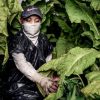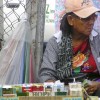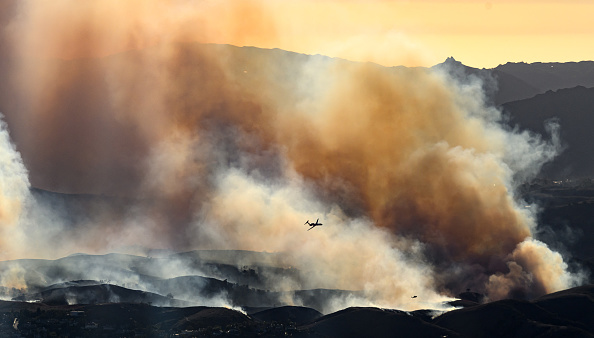
Author and Page information
- This page: https://www.globalissues.org/article/533/tobacco.
- To print all information (e.g. expanded side notes, shows alternative links), use the print version:
Tobacco and smoking have a number of negative effects:
- Tobacco smoking kills
- Tobacco exacerbates poverty
- Tobacco contributes to world hunger by diverting prime land away from food production
- Tobacco production damages the environment
- Tobacco reduces economic productivity
- While the Tobacco industry may employ people, this can be considered an example of
wasted labor
, capital and resources.
The World Health Organization has noted that policy measures such as complete bans on tobacco advertising, promotion and its sponsorship do decrease tobacco use. However, the tobacco industry uses its enormous resources to derail or weaken laws and agreements in various countries and regions.
These issues are introduced below.
On this page:
- Tobacco Smoking kills
- Tobacco Exacerbates Poverty
- Tobacco contributes to world hunger, diverting prime land from food production
- Tobacco production damages the environment
- Tobacco Reduces Economic Productivity
- The Framework Convention on Tobacco Control
- Treaty adopted despite heavy lobbying by big tobacco
- WHO
MPOWERing
countries with effective policies - Advertising bans work; self-regulation does not
- Tobacco taxes; one of the most effective measures to reduce smoking
- Progress with more countries adopting anti-tobacco measures
- Tobacco Industry Hitting Back
- Expanding into Developing Nations Markets
- Targeting Children, Teenagers and Women
- Public Relations and WHO-Discrediting Campaigns
- Corruption
- Tobacco Companies Accused of Attempting to Undermine Tobacco Treaty
- Wasted wealth, resources and labor
- Electronic cigarettes
- Free choice?
- More information
Tobacco Smoking kills
The world’s premier health organization, the World Health Organization (WHO) is quite blunt about the impacts of tobacco and smoking:
- Tobacco smoking is the second major cause of death in the world.
- An estimated 1.3 billion people smoke
- 84% of all smokers live in developing and transitional economy countries
- Tobacco is the fourth most common risk factor for disease worldwide.
- Second-hand smoke is also a very serious problem:
- Second-hand smoke causes 600,000 premature deaths per year.
- Of the over 4000 chemicals in tobacco smoke, at least 250 are known to be harmful and more than 50 are known to cause cancer.
- About 40% of all children are regularly exposed to second-hand smoke at home.
- 31% of the deaths attributable to second-hand smoke occur in children.
- 10% of the economic costs related to tobacco use are attributable to second-hand smoke.
- Tobacco companies spend tens of billions of dollars each year on tobacco advertising, promotion and sponsorship. One third of youth experimentation with tobacco is attributed to this spending
Sources:
- Why is tobacco a public health priority?, WHO, December 1, 2004
- FAQ on the WHO Framework Convention on Tobacco Control and the context in which it was negotiated, WHO, September 20, 2004
Back to top
Tobacco Exacerbates Poverty
It is worth citing the WHO again for a summary of how tobacco exacerbates poverty:
Tobacco and poverty are inextricably linked. Many studies have shown that in the poorest households in some low-income countries as much as 10% of total household expenditure is on tobacco [and therefore] less money to spend on basic items such as food, education and health care. In addition to its direct health effects, tobacco leads to malnutrition, increased health care costs and premature death. It also contributes to a higher illiteracy rate, since money that could have been used for education is spent on tobacco instead. Tobacco’s role in exacerbating poverty has been largely ignored by researchers in both fields.
John Madeley also notes in his book, Big Business Poor People (Zed Books, 1999), that heavy advertising of tobacco by Transnational Corporations (TNCs) can convince the poor to smoke more, and to use money they might have spent on food or health care, to buy cigarettes instead.
Back to top
Tobacco contributes to world hunger, diverting prime land from food production
Smoking also contributes to world hunger as the tobacco industry diverts huge amounts of land from producing food to producing tobacco as John Madely also notes:
Dr Judith MacKay, Director of the Asian Consultancy on Tobacco Control in Hong Kong, claims that tobacco’s
minoruse of land denies 10 to 20 million people of food.Where food has to be imported because rich farmland is being diverted to tobacco production, the government will have to bear the cost of food imports,she points out.… The bottom line for governments of developing countries is that the net economic costs of tobacco are profoundly negative—the cost of treatment, disability and death exceeds the economic benefits to producers by at least US$200 billion annually
with one third of this loss being incurred by developing countries.
Back to top
Tobacco production damages the environment
Madeley also describes in detail other impacts on land from tobacco use:
- The land that has been destroyed or degraded to grow tobacco has affects on nearby farms. As forests, for example, are cleared to make way for tobacco plantations, then the soil protection it provides is lost and is more likely to be washed away in heavy rains. This can lead to soil degradation and failing yields.
- A lot of wood is also needed to cure tobacco leaves.
- Tobacco uses up more water, and has more pesticides applied to it, further affecting water supplies. These water supplies are further depleted by the tobacco industry recommending the planting of quick growing, but water-thirsty eucalyptus trees.
- Child labor is often needed in tobacco farms.
For more detail, refer to Big Business Poor Peoples; The Impact of Transnational Corporations on the World’s Poor, by John Madeley, (Zed Books, 1999) ch. 4.
Back to top
Tobacco Reduces Economic Productivity
Summarizing from the WHO again:
The economic costs of tobacco use are equally devastating. In addition to the high public health costs of treating tobacco-caused diseases, tobacco kills people at the height of their productivity, depriving families of breadwinners and nations of a healthy workforce. Tobacco users are also less productive while they are alive due to increased sickness. A 1994 report estimated that the use of tobacco resulted in an annual global net loss of US$ 200 thousand million, a third of this loss being in developing countries.
A report by the Campaign for Tobacco-Free Kids says that from a socioeconomic and environmental perspective, there is little benefit in tobacco growing , and that While a few large-scale tobacco growers have prospered, the vast majority of tobacco growers in the Global South barely eke out a living toiling for the companies.
Furthermore, the cigarette companies continue to downplay or ignore the many serious economic and environmental costs associated with tobacco cultivation, such as chronic indebtedness among tobacco farmers (usually to the companies themselves), serious environmental destruction caused by tobacco farming, and pesticide-related health problems for farmers and their families.
Back to top
The Framework Convention on Tobacco Control
The world’s first global health treaty—the Framework Convention on Tobacco Control (summary), adopted May 2003—became international law in February 2005.
Amongst other things, the treaty requires countries to
- Impose restrictions on tobacco advertising, sponsorship and promotion;
- Establish new packaging and labeling of tobacco products (e.g. ban misleading descriptions such as
low tar
andlights
😉 - Establish clean indoor air controls; and
- Strengthen legislation to clamp down on tobacco smuggling.
Treaty adopted despite heavy lobbying by big tobacco
This treaty was adopted despite a sustained campaign by the tobacco lobby via certain governments to dilute it—particularly the United States, Germany and Japan,
as the British Medical Journal (BMJ) reported (Tobacco Lobby Threatens to Derail Global Antismoking Treaty
, February 12, 2005, Volume 330, p. 325.)
Furthermore, pressure from the industry has not let up … the United States proposed a clear reference to global trade rules
potentially allowing companies and governments to attack the legally binding health treaty under trade laws, even though the … treaty gives governments the right to prioritize health over trade issues.
As the BMJ also noted, poor countries are now more vulnerable to the powerful tobacco industry and need support in implementing tough anti-tobacco measures.
In recent years, in wealthy countries, attempts have been made to introduce smoke-free legislation. In California for example, smoke-free laws were introduced in July 1998. As the Californian Medical Association’s president, Dr. Robert Hertza commented, California’s lung cancer rates have fallen six times faster than in US states without smoke-free laws.
(Smoke-free workplaces would hit tobacco profits
, BMJ, Vol. 330, p.325) This illustrates the potential of treaties such as this global tobacco treaty to save lives of millions.
WHO MPOWERing
countries with effective policies
Advertising bans work; self-regulation does not
Tobacco taxes; one of the most effective measures to reduce smoking
Progress with more countries adopting anti-tobacco measures
Back to top
Tobacco Industry Hitting Back
The tobacco companies have tried various ways to minimize damage impact to their sales and reputation. They have sought to expand markets in other areas, especially the developing world as they find the industrialized nations are increasingly hostile to their industry. Attempts at regulation are fought with various public relations attempts, and corruption.
Four companies now control 75 percent of global cigarette sales, as sophisticated strategies for supply, production and sales have produced increasingly popular global brands.
The onward march of Marlboro man epitomises this globalisation, exploiting the opportunities presented by trade liberalisation, regional organisations and the communications revolution. Control efforts are undermined by the industry’s success in developing favourable relationships with many governments, the magnitude of their foreign direct investments and the scale of advertising, marketing and sponsorship campaigns. In addition, large-scale cigarette smuggling, which comprises one-third of total exports, depletes tax revenues and further jeopardises public health.
Expanding into Developing Nations Markets
In recent years, the damage caused to a person’s health by tobacco consumption has been confirmed, attracted particular scrutiny at tobacco firms because they knew this for years, but attempted to hide their research.
Some countries, such as the US have had the resources and political will to tackle the large tobacco corporations. However, combined with the resulting smaller and tougher markets in the rich countries, multinational tobacco firms have intensified their efforts in other regions of world such as Asia, to continue growing and selling cigarettes, as well as expanding advertising (to create demand, not meet). And they have been successful, too. 84% of the estimated 1.3 billion smokers live in developing and transitional economy countries as the WHO has noted.
Targeting Children, Teenagers and Women

Public Relations and WHO-Discrediting Campaigns
The tobacco industry has gone to extraordinary levels to discredit the World Health Organisation and others that are fighting tobacco issues, a WHO report charges.
A Committee of Experts had been set up in October 1999 to inquire into the nature and extent of undue influence which the tobacco industry had exercised over UN organisations.
This Committee produced the report that found that the tobacco industry regarded the World Health Organization as one of their leading enemies, and that the industry had a planned strategy to
They added that the tobacco industry documents show that they carried out their plan by:contain, neutralise, reorient
WHO’s tobacco control initiatives.
- Staging events to divert attention from the public health issues raised by tobacco use;
- Attempting to reduce budgets for the scientific and policy activities carried out by WHO;
- Pitting other UN agencies against WHO;
- Seeking to convince developing countries that WHO’s tobacco control program was a
First World
agenda carried out at the expense of the developing world; - Distorting the results of important scientific studies on tobacco;
- Discrediting the WHO as an institution.
Corruption
PAHO, the Pan American Health Organization (a regional office for the Americas for the WHO) issued a report titled Profits over People (17 December 2002). Looking at the Latin American and Caribbean countries and information from Philip Morris and British American Tobacco, the report details how the tobacco companies:
- Were intensely competitive but collaborated in campaigns against common threats to the industry
- Hired scientists throughout the region to misrepresent the science linking secondhand smoke to serious diseases, while cloaking in secrecy any connection of these scientists with the tobacco industry;
- Designed
youth smoking prevention
campaigns and programs primarily as public relations exercises aimed at deterring meaningful regulation of tobacco marketing; - Had detailed knowledge of smuggling networks and markets and actively sought to increase their share of the illegal market by structuring marketing campaigns and distribution routes around it; and
- Enjoyed access to key government officials and succeeded in weakening or killing tobacco control legislation in a number of countries.
They also added that these tactics and strategies are not unique to the Americas region.
Reports such as those mentioned above show that there is a lot of political maneuvering by large tobacco companies to lower prices, to increase sales, etc. In addition, the poor and small farmers are the ones most affected by the impacts of tobacco companies. The hard cash earned from this foreign investment
is offset by the costs in social and public health and the environment. In effect, profits are privatized; costs are socialized.
Back to top
Wasted wealth, resources and labor
While the tobacco industry no doubt provides jobs for many people around the world, the total negative effects of the industry and of smoking tobacco suggests that this is wasted wealth
and wasted labor.
Talented scientists and business people currently employed by this industry could potentially be working in other areas contributing to society in a more positive way, while agricultural workers could potentially be producing less damaging products, for example.
(Wasted wealth and wasted labor and wasted resources are discussed in more depth later in this site’s section on consumption and consumerism.)
Note that this does not have to be an authoritarian ban, as free choice is still a treasured value. Instead:
- True costing of tobacco (factoring in health, environment and social costs, as well as additional economic costs that might be externalized) would increase the cost of tobacco products to a higher and more realistic value.
- That could help pay for dealing with the various damages. It may potentially deter those whose
free
choice has been influenced by the numerous public relations, advertising and propaganda of the tobacco industry. (Some countries such as the UK do add taxes onto cigarettes, but largely to only cover health costs.) - Enormous PR related resources would be freed up for other needs, such as helping the tobacco industry clean up, diversifying into other areas, etc.
- Heavily-burdened health services would additionally free up, thus leading to a potentially
snow-balling
series of positive effects.
A lot of this is perhaps wishful thinking, as the tobacco industry would lose out a lot, and no industry would like that. Their size, power and thus influence, means that they will (and have) hit back in many ways to dilute effective action.
Back to top
Free choice?
It is often argued by those who prefer to smoke and not see more and more restrictions put in place that it is their free choice to smoke. Some will add that they do not smoke in front of children, etc and thus sound responsible.
Yet, on the one hand how free a choice is it to decide to smoke? Advertising, peer pressure, modern culture, stress all combine to give reasons for people to smoke.
Furthermore, it may seem like a free choice to only harm oneself when deciding to smoke, but second hand smoking also kills.
And perhaps more remote than that is people half way around the world may be going hungry because land that could have been growing and sustaining local people is now diverted into environmentally damaging and wasteful tobacco production.
If one does not wish to give up smoking because it is considered free choice, how about quitting smoking so others may have a choice?
Back to top
More information
Below are a list of stories from Inter Press Service as they cover issues around tobacco further:
-
WHO hails Mauritius, Netherlands for tobacco control measures but global risks remain
– UN News

Despite the welcome news that more than seven in 10 people on the planet – 5.6 billion – are now protected by measures to curb the dangers of tobacco smoke, 8.7 million people still die from tobacco-related diseases every year, the UN World Health Organization (WHO) said on Monday.
-
US Ban on Smoking Undermined by Tobacco Industry
– Inter Press Service

UNITED NATIONS, Jun 01 (IPS) – The US has some of the strictest laws against smoking in public, including a 1997 executive order which bans smoking in all government federal buildings.
But still, the tobacco industry and its allies do not rest, says Dr. Jarbas Barbosa, Director of the Washington-based Pan American Health Organization (PAHO).
-
Stop tobacco farming, grow food instead, says WHO
– UN News

With hunger spreading worldwide and tobacco responsible for eight million deaths each year, countries should stop subsidizing tobacco crops and help farmers grow food, the World Health Organization (WHO) said on Friday.
-
Malawi: Child trafficking and forced labour push thousands to work on tobacco farms
– UN News

Large numbers of children working on tobacco farms in Malawi are missing school, 13 UN-appointed independent human rights experts said on Wednesday, urging the Government and tobacco companies there to step up human rights protection across the supply chain.
-
Make tobacco industry accountable for environmental damage: UN health agency
– UN News

The tobacco industry damages both the environment and human health, and needs to be more accountable for the destruction it causes, declared the World Health Organization (WHO) on Tuesday.
-
Child Labour: No Quick End to Children Trapped in Tobacco Production
– Inter Press Service

HONG KONG / LOME, May 17 (IPS) – Despite World Day Against Child Labour launched in 2002 by the International Labour Organization (ILO), little has changed over the past two decades for the millions of children who remain trapped.
-
Seeds of change in Kenya as farmers lead way on tobacco-free farms
– UN News

In Kenya, a trailblazing sustainable agriculture project has helped hundreds of farmers move away from the harmful practice of growing tobacco, in favour of a healthier alternative, the UN said on Wednesday.
-
Tobacco use continues to fall
– UN News

The number of tobacco users continues to decrease globally, going from 1.32 billion in 2015 to 1.30 billion last year, the World Health Organization (WHO) said onTuesday.
-
Progress on tobacco fight, but new nicotine products pose increasing threat
– UN News

While many countries are making progress in the fight against tobacco use, a new World Health Organization (WHO) report shows some are failing to address the problem of emerging nicotine and tobacco products.
-
The COVID-19 pandemic motivates millions of tobacco users to quit, but they need support
– UN News

“Quitters are the real winners in the case of tobacco”, says the World Health Organization as part of a campaign to help smokers that have decided to quit during the COVID-19 pandemic, but lack the support to do so. A new chatbot and even an AI assistant are ready to aid them in their quitting journey.
-
Tobacco Industry Factoid on Illicit Trade Leading Governments Astray
– Inter Press Service

BANGKOK, Thailand, Jul 21 (IPS) – A factoid is unreliable information repeated so often that it becomes accepted as fact. One such factoid repeatedly echoed across the globe by the tobacco industry is that tobacco tax increases worsen cigarette smuggling.
-
Case Against Tobacco Giant Could Protect Children
– Inter Press Service

NEW YORK, Dec 03 (IPS) – Legal action against British American Tobacco (BAT), one of the world’s largest tobacco firms, could see the company punished for profiting from child labor and force the industry to finally confront its treatment of vulnerable workers.
-
Governments Must Short Circuit Tobacco Industry’s Pervasive Tactics
– Inter Press Service

BANGKOK, Thailand, Oct 25 (IPS) – The tobacco industry’s new rhetoric that smoking is harmful and that its so-called less risky products will reduce the global tobacco epidemic, should see the industry stop opposing or fighting government efforts to reduce tobacco use. However, this is not the case.
-
Swiftly Ending Tobacco Epidemic Requires Government Action, Not Empty Promises
– Inter Press Service

WASHINGTON DC, Oct 23 (IPS) – New information published in the Morbidity and Mortality Weekly Report shows that action taken by just 11 countries – most of them low- or middle-income – has resulted in 20 million fewer adult tobacco users in 2017 compared with 2008. Seventy percent of the world’s tobacco users live in low- and middle-income countries.
-
Why Governments Must Prioritise Sustained Tobacco Control Investment in Low- & Middle-Income Nations
– Inter Press Service

OTTAWA, Sep 02 (IPS) – Trends in global consumption of cigarettes haven’t improved since the World Health Organization’s (WHO) Framework Convention on Tobacco Control (FCTC) came into force, according to a study published in the British Medical Journal (BMJ) earlier this summer.
-
U. S. Backing for Heated Tobacco Products Triggers Misrepresentation
– Inter Press Service

BANGKOK, Thailand, Jun 14 (IPS) – Wendell Balderas is Media & Communications Manager of the Southeast Asia Tobacco Control Alliance (SEATCA)
The U.S. Food and Drug Administration’s (FDA) decision authorizing the sale of Philip Morris International (PMI)’s heated tobacco system, IQOS, in the United States inadvertently puts a foot in the door to increase sales of new tobacco products in the developing world.
-
Revealed – A Roadmap to Defeat Tobacco Tax & Keep Indonesians Addicted
– Inter Press Service

BANGKOK, Thailand, Apr 11 (IPS) – Dr. Ulysses Dorotheo is Executive Director of the Southeast Asia Tobacco Control Alliance (SEATCA)*
The image of a smoking toddler from Indonesia horrified the world but did little to motivate local policy makers to enact measures to protect children and youth from the harms of tobacco use. Indonesia has one of the world’s highest smoking rates where two out of three men and about 40 percent of adolescent boys smoke.
-
Tobacco Industry Targets Women in Asia
– Inter Press Service

BANGKOK, Thailand, Mar 14 (IPS) – Wendell Balderas is Media & Communications Manager & Mary Assunta is Senior Policy Advisor, Southeast Asia Tobacco Control Alliance (SEATCA)*
International Women’s Day on 8 March recognized and celebrated the progress women are making globally. The day also acknowledged the risks, exploitation and suffering many continue to endure.
-
Thailand First Asian Nation to Join Global Efforts to Control Tobacco
– Inter Press Service

BANGKOK, Thailand, Nov 20 (IPS) – Wendell C Balderas is Media and Communications Manager, Southeast Asia Tobacco Control Alliance (SEATCA)Thailand is set to become the first Asian country to introduce standardized packaging of tobacco. On 14 November 2018, the Thai National Committee on Tobacco Control approved the Ministry of Health Regulation that requires cigarettes in Thailand to be sold in packaging stripped of the fancy, colorful and unique cigarette branding.
-
ILO Fails to Cut Ties with Tobacco Industry – Yet Again
– Inter Press Service

YAOUNDE, Mar 20 (IPS) – Tih Ntiabang is Regional Coordinator – AFRO, Framework Convention Alliance, CameroonLast week, the International Labour Organization’s (ILO) governing body postponed yet again a decision to stop accepting money from the tobacco industry for its projects to end child labour in the tobacco growing sector.
-
UN Agency Defers Action Cutting Ties to Tobacco Industry
– Inter Press Service

UNITED NATIONS, Nov 21 (IPS) – Back in November 2008, the 193-member General Assembly decided, by consensus, to ban smoking and tobacco sales at the UN headquarters in New York: a ruling observed by all affiliated agencies worldwide, including the Geneva-based World Health Organization (WHO) which has severed links with the tobacco industry.
-
Global Campaign to Smoke Out Tobacco Firms from UN Body
– Inter Press Service

UNITED NATIONS, Oct 19 (IPS) – The world’s tobacco companies – which have been widely ostracized in the UN system – may be ousted from one of their last fortified strongholds in the United Nations: the International Labour Organization (ILO).
-
WHO Urges Govt’s to Raise Taxes on Tobacco
– Inter Press Service

UNITED NATIONS, Jul 19 (IPS) – Seven million people die each year from tobacco-related deaths, according to a new report published by the World Health Organisation today.
-
Tobacco Industry Misleads Developing Countries Over Regulations
– Inter Press Service

UNITED NATIONS, Jan 13 (IPS) – Low and middle-income countries have far fewer tobacco regulations than high-income countries and are paying the price – with bigger health and economic impacts.
-
Uruguay’s Victory over Philip Morris: a Win for Tobacco Control and Public Health
– Inter Press Service

GENEVA, Aug 22 (IPS) – In a landmark decision that has been hailed as a victory of public health measures against narrow commercial interests, an international tribunal has dismissed a claim by tobacco giant company Philip Morris that the Uruguay government violated its rights by instituting tobacco control measures.
-
Can Poor Countries Combat Big Tobacco Too?
– Inter Press Service

UNITED NATIONS, May 31 (IPS) – This year for World No Tobacco Day on May 31 the World Health Organization has recommended that countries adopt plain packaging as a way to reduce tobacco use, however so far mostly only rich countries have been able to afford to implement the changes.
-
Curbing Tobacco Use – One Step Forward, Two Steps Back
– Inter Press Service

ABU DHABI, Apr 02 (IPS) – The numbers are in, and there’s not much to celebrate: every year, about six million people die as a result of tobacco use, including 600,000 who succumb to the effects of second-hand smoke.
-
Tobacco Workers in Cuba Dubious About Opening of U.S. Market
– Inter Press Service

SAN JUAN Y MARTÃNEZ, Cuba, Feb 28 (IPS) – “We have to wait and see,” “There isn’t a lot of talk about it,” are the responses from tobacco workers in this rural area in western Cuba when asked about the prospect of an opening of the U.S. market to Cuban cigars.
-
Should we celebrate 10 years of the global tobacco control treaty?
– Inter Press Service

GENEVA, Feb 18 (IPS) – February 27 will mark the 10th anniversary of the World Health Organisation Framework Convention on Tobacco Control (FCTC), the first global public health treaty.
-
Zimbabwe’s Emerging Tobacco Queens
– Inter Press Service

HARARE, May 11 (IPS) – Madeline Murambwi sits behind the wheel of her brand new Toyota Land Cruiser, threading her way through the traffic in Zimbabwe’s capital, Harare. She’s on her way back from the tobacco auction floors where she just pocketed thousands of dollars.
Back to top
Author and Page Information
- Created:
- Last updated:






